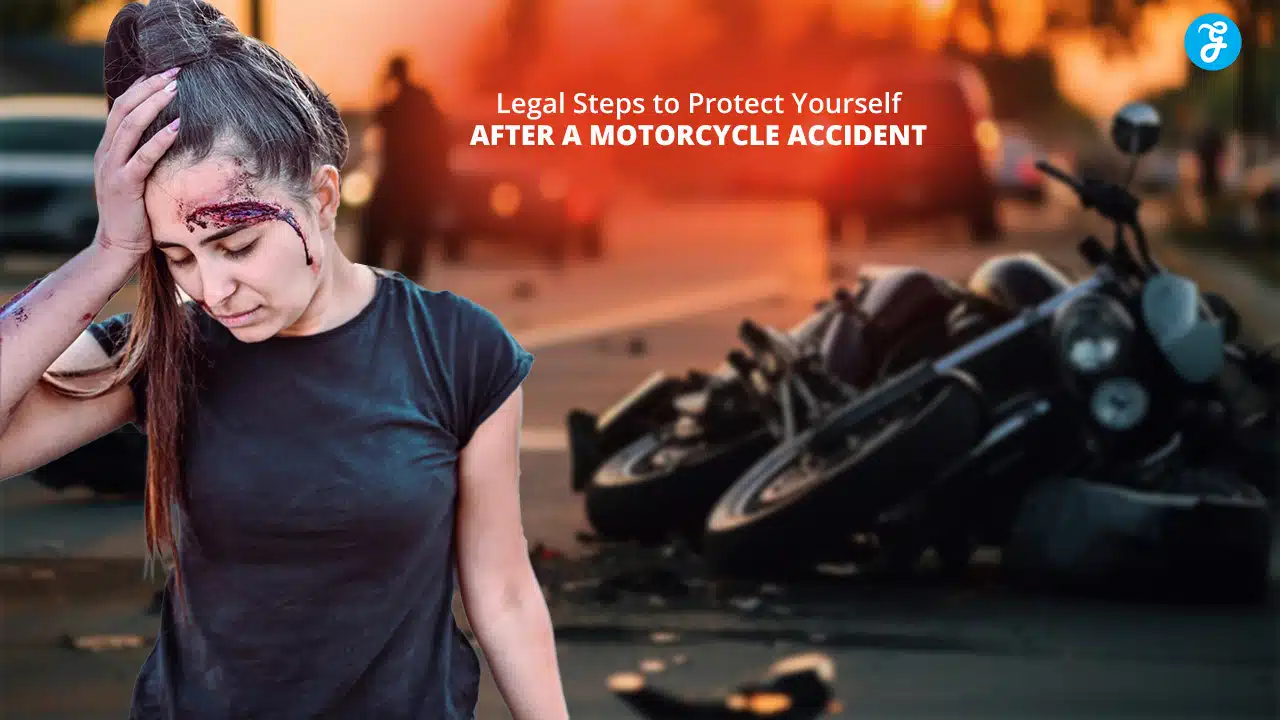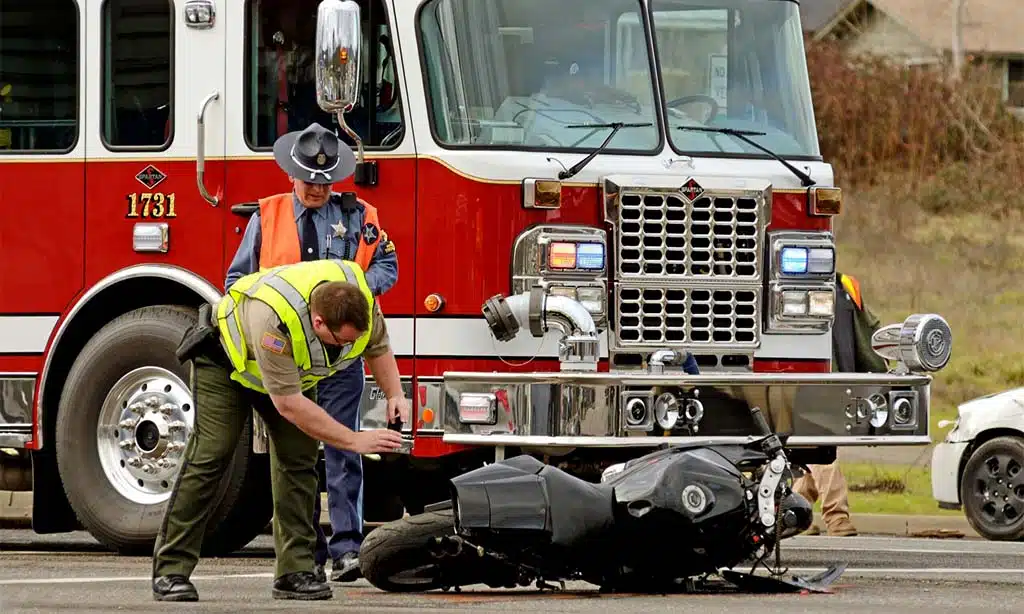Motorcycle accidents can be scary and confusing. You might not know what to do right after a crash. But taking the right steps can protect your health and legal rights.
Knowing the proper legal steps after a motorcycle accident can make a big difference in your case. These steps help you gather important info and stay safe. They also set you up to get fair treatment from insurance companies and the legal system if needed. Let’s look at 8 key steps to take after a motorcycle crash.
1. Contact the Police and File a Report
After a motorcycle accident, calling the police is a crucial step. Dial 911 right away to report the crash and request help. The police will come to the scene and gather important information.
When the officers arrive, give them a clear account of what happened. Stick to the facts and avoid guessing or admitting fault. The police will create an official report based on your statements and evidence at the scene.
Ask the officers for their names and badge numbers. You’ll also want to get the report number. This information will help you follow up later, if needed.
The police report is a key document for insurance claims and legal proceedings. It provides an unbiased record of the accident details. Make sure to get a copy of the report as soon as it’s available.
If the police can’t come to the scene, you can file a report at the nearest police station. Do this as soon as possible while the details are still fresh in your mind.
Remember, filing a police report is often required by law and insurance companies. It’s a vital step in protecting your rights after a motorcycle accident.
2. Seek Immediate Medical Attention
After a motorcycle accident, getting medical help right away is crucial. Even if you feel fine, some injuries may not show symptoms immediately.
Call 911 or ask someone to call for an ambulance. If you can’t move, stay still and wait for help to arrive. Moving could make injuries worse.
When paramedics arrive, let them examine you. Tell them about any pain or unusual feelings you’re experiencing. Be honest about your symptoms.
Go to the hospital if advised, even if you think you’re okay. Some serious injuries, like internal bleeding or head trauma, may not be obvious at first.
At the hospital, doctors will give you a thorough check-up. They’ll look for hidden injuries and treat the ones they find. Follow their instructions carefully.
Keep all medical records and bills. These documents will be important if you need to file an insurance claim or lawsuit later.
Don’t skip follow-up appointments. Your health is the top priority. Proper medical care helps you recover faster and protects your legal rights.
3. Document the Accident Scene
After a motorcycle crash, it’s crucial to gather evidence. If you’re able, take lots of photos and videos. Capture your bike, other vehicles, and the road.
Don’t forget to snap pictures of your injuries and damage to your gear. These visuals can help prove what happened and who’s at fault.
Write down what you remember about the crash. Note the time, weather, and road conditions. This information can be useful later when talking to insurance companies or lawyers.
Get contact details from witnesses. Their accounts can back up your story. Ask them what they saw and write it down.
Look for security cameras nearby. They might have caught the accident on video. Make a note of their locations so you can request footage later.
Collect any debris from the crash site. It could be important evidence. Put it in a safe place until you can give it to your lawyer.
4. Gather Witness Statements
After a motorcycle accident, witness statements can be crucial for your case. Look around for people who saw what happened. Ask them politely if they’d be willing to share what they saw.
Get their contact information. This includes names, phone numbers, and email addresses. You might need to reach out to them later for more details.
Write down or record what witnesses tell you. Use your phone to take notes or make a voice memo. Be sure to get specific details about the accident.
Ask witnesses if they’d be okay with giving a formal statement later. This could help strengthen your case if needed.
Don’t forget to thank witnesses for their time and help. Their information could make a big difference in sorting out what happened.
If possible, ask witnesses to stay until the police arrive. They can give their account directly to the officers for the official report.
Remember, witness statements should focus on what they saw, not their opinions. Stick to the facts of the accident.
5. Notify Your Insurance Company
After a motorcycle accident, you need to inform your insurance company right away. This step is crucial for protecting your rights and starting the claims process.
Call your insurance agent or the company’s claims hotline. Give them basic details about when and where the accident happened. Be careful not to admit fault or give too much information at this stage.
Your insurance company will guide you on the next steps. They may ask you to fill out forms or provide more details later. Follow their instructions carefully to avoid issues with your claim.
Remember that your insurance policy likely requires prompt notification after an accident. Failing to do so could affect your coverage. Don’t delay in making this important call.
Keep a record of when you contacted your insurance company and who you spoke with. This information may be useful if any disputes arise later in the claims process.
6. Consult a Motorcycle Accident Attorney
After a motorcycle crash, talking to a lawyer can be really helpful. A motorcycle accident attorney knows all about these kinds of cases. They can guide you through the legal process.
You might think you can handle things on your own. But motorcycle accidents can get complicated quickly. An attorney can protect your rights and help you get fair compensation.
Look for a lawyer who specializes in motorcycle accidents. They’ll understand the unique challenges riders face. They can deal with insurance companies and gather evidence to support your case.
Many lawyers offer free first meetings. This lets you ask questions and see if they’re a good fit. Don’t wait too long to reach out. There are time limits for filing claims.
A good attorney will explain your options clearly. They’ll help you decide whether to settle or go to court. They can also figure out how much your case is worth.
Remember, insurance companies often try to pay as little as possible. A lawyer can negotiate on your behalf to get you a better deal. They know the tactics insurers use and how to counter them.
With a lawyer’s help, you can focus on healing while they handle the legal stuff. This takes a lot of stress off your shoulders during a tough time.
7. Preserve Evidence
After a motorcycle accident, gathering evidence is crucial. You need to document everything about the crash scene. Take photos of your motorcycle, other vehicles, and any property damage.
Capture images of skid marks, debris, and road conditions. These details can help show what happened. Don’t forget to photograph your injuries too.
Get contact information from witnesses. Their statements could be valuable later. Keep any torn clothing or damaged gear as evidence.
Write down what you remember about the accident. Do this as soon as you can. Memory fades quickly, so record all details while they’re fresh.
If possible, get a copy of the police report. This official document can provide important facts about the crash.
Save all medical records and bills related to your injuries. These prove the extent of your damages and the cost of your care.
Don’t repair your motorcycle right away. The damage can be key evidence. Wait until your lawyer says it’s okay to fix or replace it.
By preserving evidence, you build a stronger case. This can help you get fair compensation for your injuries and losses.
8. Avoid Discussing the Accident Publicly
After a motorcycle crash, you might want to talk about what happened. It’s normal to feel upset. But sharing details can hurt your case.
Don’t post about the accident on social media. This includes Facebook, Twitter, Instagram, and TikTok. Even private messages can be used against you.
Be careful what you say to friends and family. They might have to testify later. It’s best to keep quiet about the crash details.
Insurance companies look for ways to pay less. They check social media and ask people questions. Anything you say can be twisted.
Only talk about the accident with your lawyer. They know how to protect you. Your conversations with them are private.
If someone asks about the crash, just say you can’t discuss it. Tell them to talk to your lawyer instead. This keeps you safe from saying something wrong.
Remember, even small comments can cause big problems. It’s always better to say less than more. Let your lawyer do the talking for you.
Understanding Legal Obligations
After a motorcycle accident, you need to know your legal duties. These include reporting the crash and talking to police. Knowing what to do helps protect your rights.
Duty to Report the Accident
You must report motorcycle crashes that cause injury, death, or major property damage. Call 911 right away if anyone is hurt. For minor accidents, you can file a report at the police station. Most states require you to report crashes within 24 to 72 hours.
Don’t leave the scene until you’ve shared information with others involved. Exchange names, contact details, and insurance information. Take photos of the damage and get witness contact information if possible. Failing to report can lead to fines or charges.
Providing Statements to Police
When police arrive, give them basic facts about what happened. Stick to the key details: • Where and when the crash occurred; • Who was involved; • What happened leading up to the accident
Be honest but don’t admit fault. Avoid saying “I’m sorry,” as it may be seen as taking blame. You can say “I’m not sure” if you don’t know something. Ask for a copy of the police report before leaving.
Remember, you have the right to speak with a lawyer before giving a full statement. If you’re seriously hurt, focus on getting medical care first. You can give a statement later, when you’re able.
Identifying Responsible Parties
After a motorcycle accident, figuring out who’s at fault is crucial. This helps you know who to seek compensation from. Let’s look at how to determine fault and what comparative negligence means for your case.
Determining Fault
To find out who’s responsible, gather evidence at the crash scene. Take photos of vehicle damage, skid marks, and road conditions. Get contact info from witnesses. Their statements can help prove what happened.
Police reports are key. They often include the officer’s view on who caused the crash. Get a copy as soon as you can.
Traffic laws matter too. Did someone run a red light? Were they speeding? Knowing these details helps show who broke the rules.
Sometimes experts like accident reconstructionists are needed. They used science to figure out how the crash happened.
Understanding Comparative Negligence
Comparative negligence means fault can be shared. You might be partly responsible for the accident. This affects how much money you can get.
In some states, if you’re more than 50% at fault, you can’t get any money. Other states let you get money even if you’re mostly to blame.
Your actions during the crash are looked at closely. Were you following traffic laws? Were you paying attention?
If you’re found partly at fault, your compensation goes down. For example, if you’re 20% responsible, you’ll get 20% less money.
It’s smart to talk to a lawyer about this. They can help you understand how comparative negligence might affect your case.
Documenting the Accident
After a motorcycle crash, gathering proof is key. Good records will help your case later. Here’s how to document things well:.
Collecting Evidence
Get contact information from everyone involved. Write down names, phone numbers, and addresses of other drivers and witnesses. Note the make, model, and license plates of all vehicles. Ask for insurance details from other drivers.
Write down what you remember about the crash. Include the time, date, and weather. Note road conditions and any traffic signs or signals nearby. Get a copy of the police report as soon as it’s ready.
Keep all medical records and bills. Save receipts for any costs tied to the accident. This helps show how the crash affected you.
Taking Photographs
Photos are strong proof. Use your phone to take lots of pictures at the scene. Snap shots of all vehicles from many angles. Focus on damaged areas. Capture skid marks, debris, and road conditions.
Take pictures of your injuries. Keep taking photos as you heal. This shows how bad your injuries were and how long they lasted.
Get shots of the whole accident area. Include traffic signs, lights, and road layout. These can help experts figure out what happened later.
Don’t forget to photograph your gear. Damaged helmets, clothes, and bike parts can be important proof.
Summary
Navigating the aftermath of a motorcycle accident can be overwhelming, but taking the right legal steps is crucial to protecting your rights and ensuring your recovery.
From contacting the police and seeking immediate medical attention to documenting the scene and consulting with an attorney, each action plays a vital role in building a strong case.
These steps not only safeguard your health but also position you to receive fair compensation from insurance companies and any legal proceedings that may follow.
By understanding and following these essential legal actions, you can better manage the complexities of the situation and focus on your recovery, knowing that you have taken the necessary steps to protect your future.






































